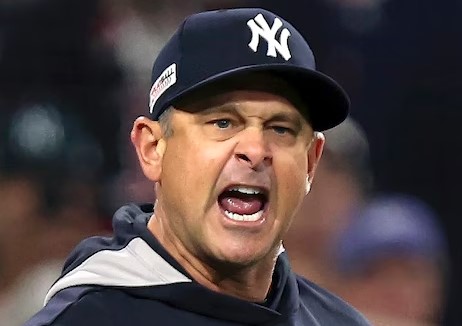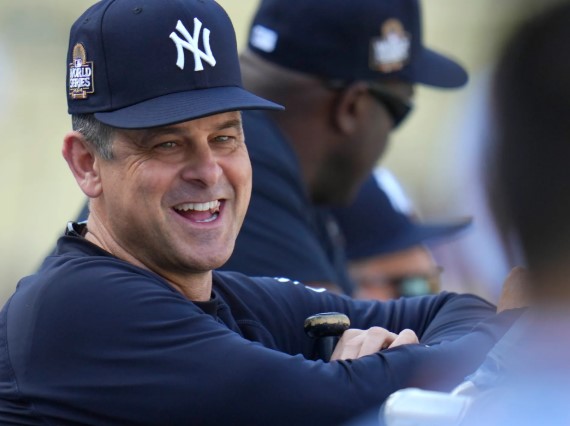“The Comfort Trap: How Aaron Boone’s Soft Approach Is Slowly Smothering the Yankees”
By [Your Name]
NEW YORK — Aaron Boone paces the dugout, arms folded, lips pressed into a thin line as another ground ball finds a glove, another strikeout leaves runners stranded, and another game slips away. The camera pans to him often, seeking a spark, a meltdown, anything.
But Boone rarely explodes. Rarely calls out his players publicly. Rarely shakes the snow globe.
And that’s exactly the problem.
In a city that demands accountability, in a franchise built on rings and ruthlessness, Boone’s gentle, protective approach to managing his players is quietly smothering the Yankees’ potential—and it’s wearing on the patience of a fanbase that can feel the clock ticking on a championship window.
“We believe in these guys,” Boone often says postgame, even after lifeless losses. “They’re grinding.”
Sure, they’re grinding. But is it enough? And at what point does belief turn into enabling?

The Good Intentions
Let’s be fair: Boone’s approach is rooted in genuine care. He wants to protect his players from the relentless New York media, the weight of expectations, the cruel social media cycles that can break confidence overnight.
Inside the clubhouse, Boone is known as a player’s manager. He checks in. He listens. He defends. He shields.
To a point, it works. Players appreciate the protection. Veterans don’t feel thrown under the bus after a bad outing. Young players aren’t terrified that a slump will get them buried in the minors.
But baseball, like life, isn’t always about comfort.
The Comfort Trap
Boone’s approach has created a comfort trap: a space where accountability often feels optional, where underperformance can hide behind clichés, where the edge that built Yankees legends is dulled by constant reassurance.
You see it in postgame interviews:
-
After a sloppy defensive game: “We’re going to clean that up.”
-
After runners left on base again: “We’ll keep grinding.”
-
After a pitcher gets shelled: “I still believe in his stuff.”
At some point, the words lose weight. The fans hear them, game after game, and wonder if Boone is watching the same games they are.
“The Yankees need a jolt, not a hug,” one lifelong fan said outside Yankee Stadium after another disappointing series.
And they’re right.
Leadership in the Bronx
The Yankees have the talent. Aaron Judge, Gerrit Cole, and a core capable of contending year after year. But the hunger feels inconsistent, the urgency missing in moments that matter.
Joe Torre knew when to comfort and when to confront. Joe Girardi, for all his flaws, was a manager who held players accountable, who wasn’t afraid to show frustration when effort and execution weren’t matching the moment.
Boone? He is calm, steady, and positive. But in a city like New York, calm can look like complacency when the wins aren’t coming.

The Impact on Players
Ask any athlete: Comfort is nice, but growth often comes from discomfort. From being challenged. From being told the truth, even when it’s hard to hear.
Young players, in particular, need to know where they stand. They need the edge that comes from a manager who expects excellence, who won’t sugarcoat struggles, who demands improvement and holds players publicly accountable.
Boone’s protectiveness may come from a place of kindness, but it risks capping the potential of a team that desperately needs to find its edge.
The Fan Disconnect
Yankees fans are some of the most knowledgeable in baseball. They don’t need empty platitudes after tough losses. They want honesty. They want accountability. They want to see that the manager feels the same frustration they do when the team underperforms.
“We’re not asking him to throw a tantrum,” another fan said. “We’re asking him to act like these games matter as much as they do to us.”
In New York, showing fire isn’t a weakness. It’s a sign you care.
Boone, Himself
And here’s the hardest part: Boone’s approach isn’t just a disservice to the players and fans—it’s a disservice to himself.
Boone was hired because of his temperament, his communication skills, his ability to connect with modern players. But it’s fair to ask if he’s using that skillset to its fullest when he hesitates to confront, to demand, to challenge.
At some point, Boone will need to decide if being liked is worth more than winning. Because in New York, the truth is simple: Winning cures everything. And not winning, while trying to stay comfortable, will eventually cost him the job he so clearly loves.
The Road Forward
The Yankees aren’t doomed. The season is long, the talent undeniable. But if Boone wants to truly lead this team to a championship, he needs to embrace discomfort. He needs to let go of the fear of upsetting players and embrace the reality that sometimes, leadership looks like tough love.
The Yankees don’t need coddling. They need urgency. They need a manager who expects greatness and holds everyone—himself included—to that standard.
Boone can be that manager.
But until he is, the comfort trap will continue to smother a team, a fanbase, and a franchise that deserves better.